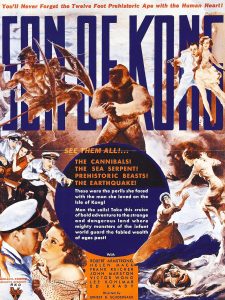I know I haven’t been blogging much lately, but here’s the latest episode of my podcast to tide you over. I’ll write more about the lack of posts later.

Hello, kaiju lovers!
After Jimmy From NASA flies him back to Indiana to get his microphone, Timothy Deal of the Derailed Trains of Thought podcast returns to Monster Island to continue the “Kong Quest” with Son of Kong, the almost forgotten sequel to King Kong. If the 1933 masterpiece is a grand myth, the sequel is a pleasant bedtime story. Screenwriter Ruth Rose, when talking about writing this film, said, “If you can’t go bigger, go funnier,” which is an apt statement about this film and sequels in general. Nathan and Tim’s lively discussion connects Son of Kong to the Russian film Battleship Potemkin, Raiders of the Lost Ark, and Terminator 2: Judgment Day—and gives Jimmy a lot of work for “Jimmy’s Notes.” They also theorize about what happened to “Mrs. Kong”/Kiko’s mother, which actually puts this and the first film into perspective…sorta. The Toku Topic builds off of the previous one with a philosophical discussion of how 1930s filmmakers addressed the Depression in their movies, touching on themes like escapism and collective rage.

Here’s the Kaijuvision Radio episode on King Kong vs. Godzilla for you to listen to as part of MIFV’s Kong coverage: Episode 8: King Kong vs. Godzilla (1962) (The Japanese Economic Miracle (The Golden 60s))
Timestamps:
Intro: 0:00-3:49
Entertaining Info Dump: 3:49-9:43
Toku Talk: 9:43-56:24
Toku Topic: 56:24-1:19:44
Outro: 1:19:44-end
© 2019 Moonlighting Ninjas Media
Bibliography/Further Reading
“Culture and Politics in the Great Depression” by Alan Brinkley
“Escapism and Leisure Time 1929-1941” (Enclopedia.com)
“How the Great Depression inspired Hollywood’s golden age” by Paul Whitington
King Kong: History of a Movie Icon from Fay Wray to Peter Jackson by Ray Morton
Kong Unbound: The Cultural Impact, Pop Mythos, and Scientific Plausibility of a Cinematic Legend (edited by Karen Haber)
Kong Unmade: The Lost Films of Skull Island by John LeMay
Son of Kong Wiki Articles
–Gojipedia
–Wikizilla
–Wikipedia
Son Of Kong (1933) Review – Kong-A-Thon Episode 2 (DMan1954)
Tracking King Kong: A Hollywood Icon in World Culture (2nd edition) by Cynthia Erb
The Uses of Enchantment: The Meaning and Importance of Fairy Tales by Bruno Bettelheim (pg. 45-60)
“Why Fantasy Matters Too Much” by Jack Zipes

